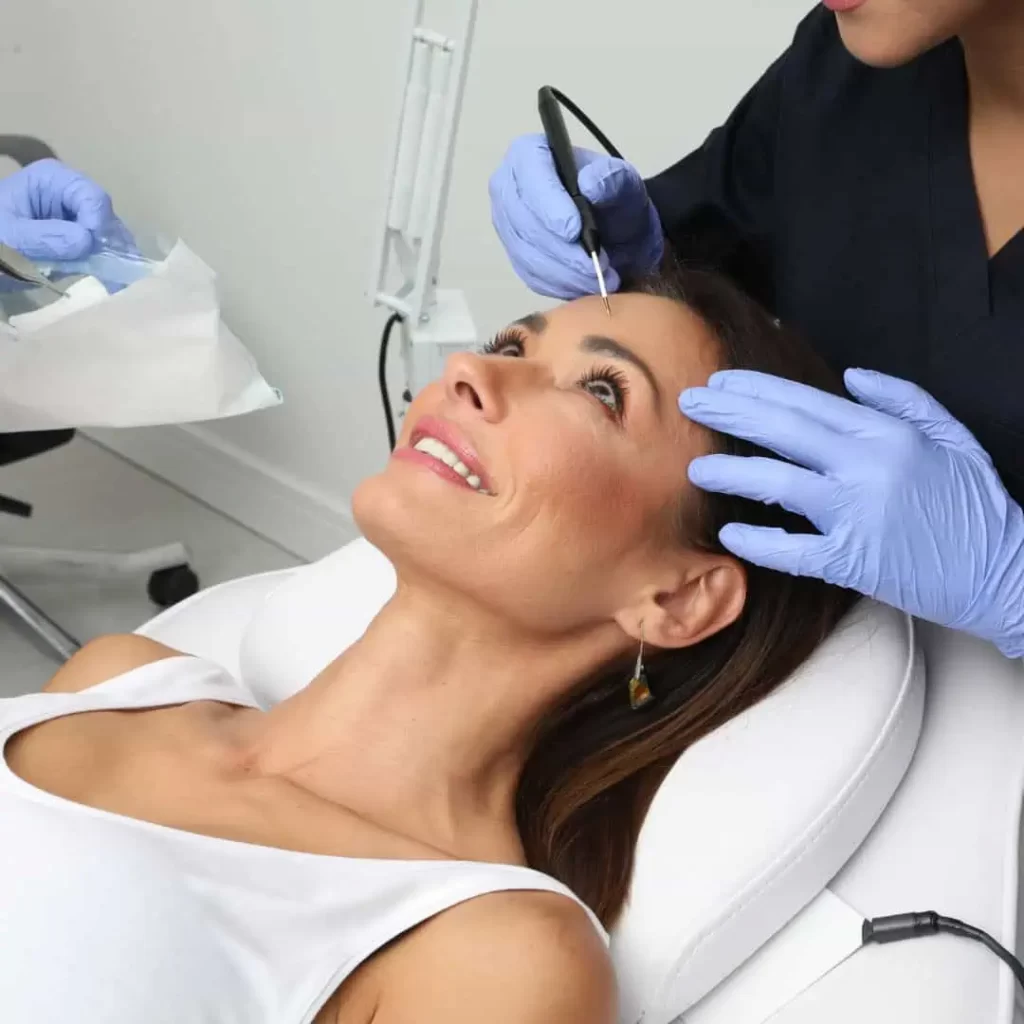A free examination by a doctor specializing in dermatology or aesthetic surgery should be scheduled while the atheroma is smaller because there is a possibility of sebaceous cysts becoming infected, when treatment is first necessary to heal the inflammation, and only then can it be removed.

Based on the examination, our doctors assess whether it is necessary to remove the sebaceous cyst using the radio wave technique.
Of course, it is possible to schedule the removal of atheroma for aesthetic reasons as well.
Free consultation for the removal of sebaceous cyst - atheroma at Diva Polyclinic
You can schedule a FREE consultation for the removal of sebaceous cysts in Belgrade with the doctors of the polyclinic Diva Dr. Bogdanović in one of our polyclinics or specialist dermatology offices:
What are sebaceous cysts (atheroma) and why do they occur?
Atheroma or epidermal cysts are caused by blockage of the sebaceous glands’ outlet ducts or by swelling of hair follicles. Given that the sebaceous glands are excretory glands – with external secretion, if their excretory duct is blocked, they are not emptied.
Then their volume increases and they appear in the form of whitish spherical bumps on the skin – closed sacs filled with whitish contents.
In addition to sebum, atheromas also contain keratin and cells of the outer coat of the hair.
In order to achieve a long-term result, it is preferable to remove the entire gland with the capsule – sheath.

How to recognize sebaceous cysts (atheroma)?
In the beginning, in most cases, a whitish nodule is noticeable – a bump on or under the skin that moves when pressed and is elastic. Atheromas can still be skin-colored or reddish, and grow over the years. The skin in that place is taut and smooth, and sometimes dilated capillaries can be seen.
They are most often localized on the face, head (and on the hairy part), chest, genital area, neck and back, but they can appear in other places on the body, except on the soles and palms.
Atheroma can be present for years, and the size varies. When they are smaller than the size of a grain of rice, treatment with radio waves is optimal. And when they are bigger, they can be up to the size of a hen’s egg, then it is recommended to treat them with classic surgical excision.
Who is susceptible to sebaceous cysts?
Atheroma often appear after puberty, less often in women, so they are linked to the male sex hormone – testosterone. In women, they appear more often on the hairy part of the head.
The appearance of sebaceous cysts is more susceptible to people who intensively use the solarium or sunbathe, as well as those who had acne during the adolescent period.
How is the diagnosis made?
A clinical examination is generally sufficient to determine whether the change that has occurred on the skin is an atheroma, and dermoscopy can be performed to avoid confusion with lipomas, fibrolipomas, and neurofibromas.
Why remove atheromas?
There are several reasons why patients turn to specialist doctors at the Diva Polyclinic to remove sebaceous cysts:
- aesthetic,
- practical (when they are in a place of constant irritation),
- when a sudden growth is observed,
- physical injury to atheroma and
- infection.
When the atheroma begins to enlarge, it is the right time to remove it to avoid inflammation or injury, which leads to more complex treatment.
When a sebaceous cyst becomes infected due to its size or the place on the skin where it is located, redness, pain and swelling occur, and it can cause a local increase in skin temperature, sometimes even bleeding. If sebum starts leaking from the atheroma, an unpleasant smell appears.

How is sebaceous cyst removal performed?
The experience of specialist doctors at the Diva Polyclinic shows that the best way to remove sebaceous cysts (atheroma) up to 7 or 8 mm in size is with radio waves, because:
- only 1 intervention is enough,
- it lasts a short time – about 40 seconds,
- such removal of atheroma is comfortable (a local anesthetic in the form of a cream is used), and
- a barely noticeable scar remains.
If it is a larger atheroma, classic surgical excision under local anesthesia is necessary.
If the infection of the dermal cyst has already occurred, then the procedure is more complicated. First, the cyst must be surgically opened and the purulent contents cleaned. Only after the resulting inflammation subsides, the sebaceous cyst with its capsule can be removed.
Can the appearance of atheroma be prevented?
The advice is to use skin care products that do not contain oils, in order to reduce the possibility of clogging the outlet of the sebaceous glands.
Removal of atheroma - sebaceous cysts
The price for removing a sebaceous cyst – atheroma using the radio wave method is from 25 to 50 euros per change in dinar equivalent value, which depends on the number of changes that are removed. If 5 or more sebaceous cysts are removed, we grant a discount at Diva Polyclinic!
For prices for removing other skin changes, see our PRICE LIST.
NOTE:
Whether radio waves are an adequate method for removing sebaceous cysts will be assessed by a specialist doctor during a free consultation.
The results of the procedure may vary from patient to patient, and this is influenced by factors such as skin type, i.e. whether it is prone to scar tissue formation.
You can read the entire disclaimer HERE.
Make an appointment for a free examination of sebaceous cysts or procedures for the removal of atheroma in Belgrade
At the polyclinic Diva Dr. Bogdanović Belgrade, with our doctors specializing in dermatology and aesthetic surgery, you can schedule a FREE consultation for the examination and removal of sebaceous cysts in one of our polyclinics or specialist dermatology offices:
to one of the phone numbers 063 338 334 or 011 3242 841 or to the email info@divaclinic.com
Our specialist doctors will tell you during the examination what kind of results you can expect after this procedure.
You can schedule an examination or procedure
· every working day from 9 a.m. to 8 p.m
· and on Saturdays from 9 a.m. to 3 p.m.
Price for specialist dermatological skin examination and dermoscopic examination of moles
If a specialist dermatological examination of the skin is required due to dermatological changes on the skin, then the price is RSD 6,000.
If you want to schedule only a dermoscopic mole examination, the price is RSD 6,000.
Your “Diva Polyclinic”
Author of the text: Dr. spec. Svetlana Bogdanović
Koautor: dr spec. Marija Šejnjanović


